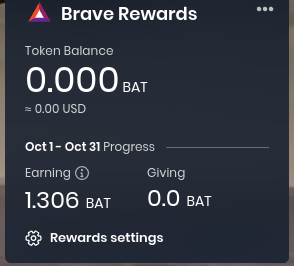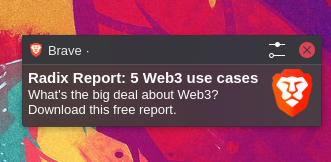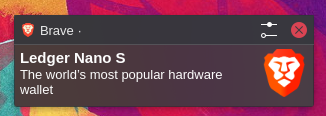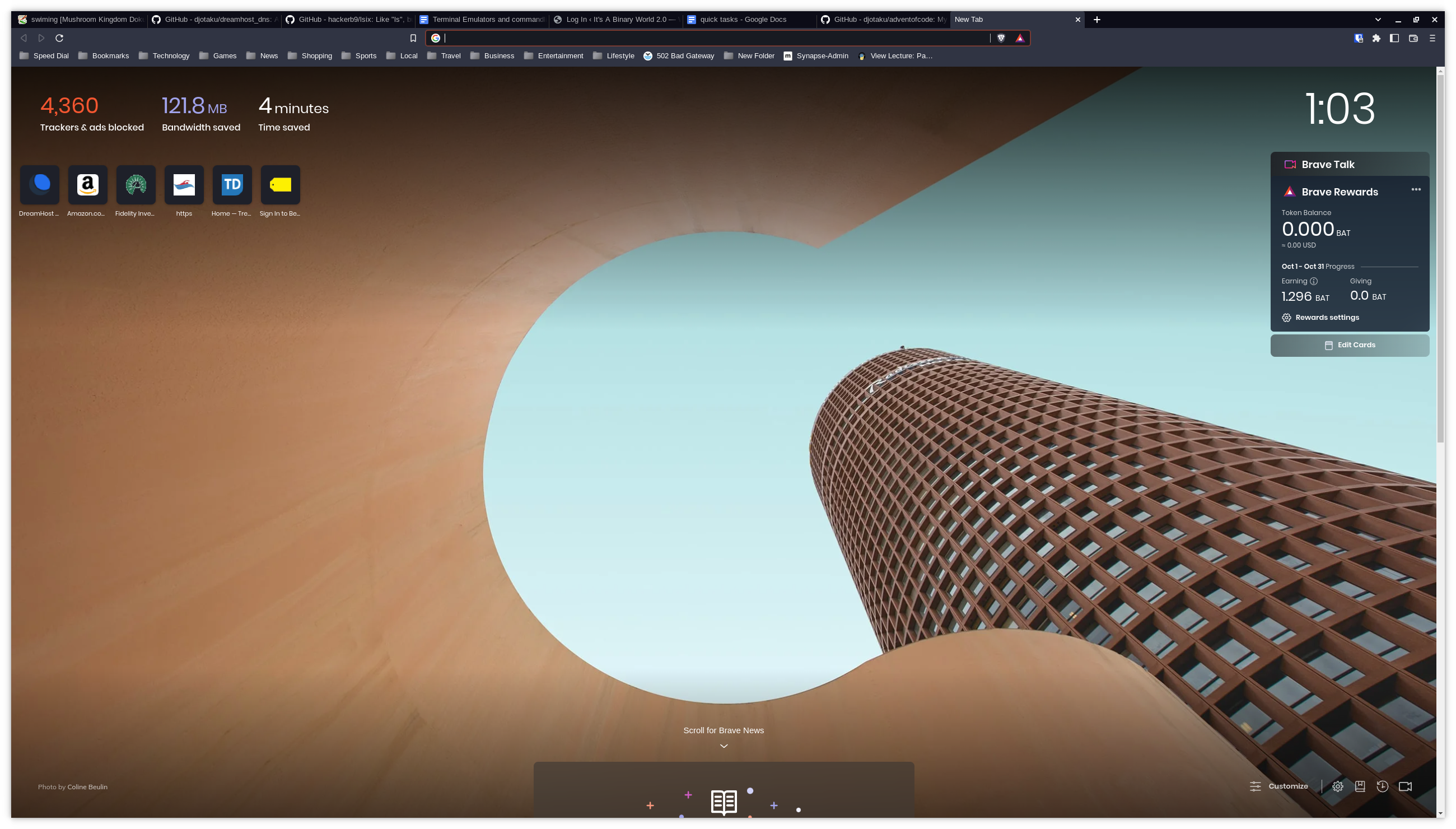Web Browsers: Brave on Linux and Brave in the News
By EricMesa
- 6 minutes read - 1178 wordsAs I did last time, I wanted my web browser post to contain both news stories about browsers that have caught my attention and my thoughts on the newest web browser I’m trying out. Let’s start with the news.
As you probably have heard if you’re paying any attention to browsers, one of the selling points of using Brave is that they replace tracking ads on the net with their own ads and then “pay” you for viewing those ads. You can then take that money and pay it out to the creators you care about and continue to support the web while not being tracked and not just blocking all ads, keeping the creators from getting paid. Sounds too good to be true? Well, this article argues that it is. Here’s a screenshot of the new tab page on Brave on my Linux computer:
Let’s zoom into the right side:
 BAT card on the new tab page
BAT card on the new tab page
In the past 2-3 weeks that I’ve been using Brave, I’ve earned 1.306 BAT. What in the world is BAT? The article linked above says it is “a cryptocurrency, the Basic Attention Token (BAT)”. Ugh! And what is it the author doesn’t like about the BAT?
For users, Brave supports only two wallets where to receive the collected BATs; these wallets have quite a bad reputation if you search online, being of low standards and suffering from several flaws.
Each separate Brave browser in your different devices, and even each new Brave install on the same device, collects BATs from zero, making it very hard to achieve the amounts needed for withdrawal.
As a content creator, I’ve also found it impossible to actually retrieve BATs.
The price of the BAT is ridiculously low. Even online paid surveys, ad-viewing and other small side hustles pay better. And it’s strongly correlated to Bitcoin (see plot), which suggests that it hasn’t much intrinsic value.
Last, Brave just added its own wallet, but, unbelievably, it cannot directly save the BATs you collect on Brave itself!!!
LucianoSphere - I like the principles behind Brave browser, but I don’t think users will ever truly “earn by surfing”
Not exactly the best praise for this BAT. But all is not bad news for Brave. One of the neat thing these smaller browsers are doing (even if they’re based on Google’s Chromium) is experimenting with different ways for making the web better. T his article talks about Brave getting rid of those annoying Cookie Preference popups that have come about as a result of the European Union’s well-intentioned laws. The article itself is unclear about what Brave is doing. Is it just clicking “yes” to all or only “necessary” cookies? When I followed through to the Brave announcement, it looks like they’re just blocking the banner, not recording any specific preferences. Here’s how they explain their choices:
One approach (which Brave uses) is to block cookie banners, and to hide and to modify pages to remove any additional annoyance such systems include (such as overlays, preventing scrolling, etc.). Other Web-privacy tools (such as uBlock Origin) can be configured to use this same approach. This approach provides the strongest privacy guarantees: it doesn’t require trusting that the cookie consent systems will respect your choice, and prevents your browser from needing to communicate with consent-tracking systems at all.
The other approach is to trust and work with cookie banners. Instead of blocking these systems (as Brave does), this alternate approach automates the process of clicking “no” in cookie-banner systems. While this approach may reduce the number of cookies sent and the overall nuisance of banners, it still records your preference with the cookie banner providers. This creates a situation of requiring the browser or extension to repeatedly ask the cookie banner provider to leave you alone. Worse, researchers have found that many cookie-and-consent systems still track people, even when users reject all cookies.
I guess I see what they’re doing here, but are they risking breaking the site? Or does it just end up by default only enabling the cookies necessary for the site?
One final browser story before I get to my review of using Brave on Linux. Tech Radar mentions that web browsers aren’t evolving as much as they used to. Compared to Mozilla’s heyday, most people are once again just using the defaults: Edge on Windows, Chrome on Android Phones and Chromebooks, and Safari on Mac. The browsers have gotten good enough so most people don’t change to Firefox (or derivative browsers) or the many Chromium browsers (Brave and Vivaldi among them). The author does say there may be some hope since Brave’s numbers are increasing, but time will tell. I know from having lived through the 1990s that defaults can be very powerful, it’s how Internet Explorer took hold even though Microsoft was late to the web party.
OK, so how has using Brave worked out for me? For the most part, it’s fine. All the Chromium browsers are mostly the same when it comes to the web rendering components. So it’s not like I’m going to notice that a site works any better or worse. While writing this article, I did open up Ars Technica and see that Brave is removing the ads from the articles. They didn’t happen to replace it with anything, but as you can see from the screenshot above, they’ve blocked 121MB of ads. Not important with my current internet connection as I don’t have any bandwidth limits, but it’s not nothing. Especially since I’ve only used it for a few weeks. However, there are some annoyances with Brave. For one, I’m constantly getting ads like this popping up as OS notifications:
 A screenshot of a KDE Plasma system alert from Brave 1
A screenshot of a KDE Plasma system alert from Brave 1 A screenshot of a KDE Plasma system alert from Brave 2
A screenshot of a KDE Plasma system alert from Brave 2
As you can see, they’re all for crypto and NFT things. Since I view that to be a shady part of the net, this doesn’t exactly fill me with happiness about how the browser is operating. Now, I know that Browser development needs some revenue, but as both Netscape and Opera (before bought by a Chinese company) proved, no one wants to pay for a browser. I’m just not happy that Brave’s operating costs seem to come from the pyramid scheme that is crypto. I’ve also come to love the extras that Vivaldi provides, even if it does make Vivaldi the Emacs of web browsers.
So I’m done with Brave for now. Next I’ll be moving on to qutebrowser, which I have installed on my netbook because it’s got a minimal UI and is based on using the keyboard. On my netbook the trackpad moves very slowly so the more I can do with the keyboard the better. It depends on Vim shortcuts and I’m not awesome at those, but we’ll see. I think how much I enjoy using it will probably also depend on how well it integrates with some addons that I’ve come to enjoy on the Chromium browsers.
